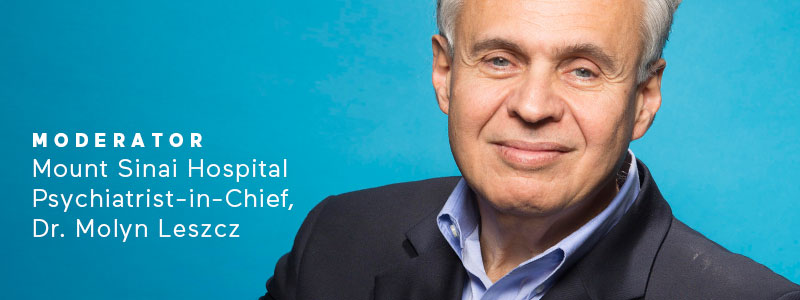

Mount Sinai partnered with various Jewish community organizations* to host a free event dedicated to the important community conversation about mental health in the Jewish Community. The event included experts in the area of adolescent and adult addiction with an emphasis on both substance (drugs and alcohol) and behavioural and process addictions (gambling, Internet, shopping). Over 220 members of the community attended the event held at the Beth Tzedec Congregation. Mount Sinai Hospital Psychiatrist-in-Chief, Dr. Molyn Leszcz moderated a panel discussion and brought his clinical expertise to the evening.
The event focused on the imperativeness of reaching out for and receiving help whether it be from the community or skilled professionals. In today’s world, technology, a tool that should make communication easier, has complicated things further. "Technology is a public health issue, especially when it comes to mental health." says CAMH's and Mount Sinai’s Dr. Bruce Ballon. Using technology has become a way of life, but there needs to be limits. The obsessive need and reliance on gadgets and social media can really put a strain on one’s mental health. There is an element of addiction present that can affect your mental health and overall well-being. Sometimes it takes talking to a family member or someone in the community to realize how technology has affected your life and learn how to begin to set boundaries.
Ori Goldstein, Director of Development from Jewish Addiction Community Services (JACS) opened the evening with a personal perspective. He has experienced a complete turnaround in his life, going from a gambler and drug addict to a member of faculty at JACS. Beginning when he was young, online gambling overwhelmed his life and introduced a new rush, a rush he’d skip work and class to obtain. Alongside his gambling, his drug addiction worsened. He experimented with all sorts of drugs, wanting more of everything. The situation was soon out of control as he accumulated thousands of dollars in debt. Fortunately, Ori was lucky enough to have friends and family who helped him pay his debts. He then received counselling from JACS Toronto, a community organization providing services pertaining to addiction for those in need and their families. Soon after, Ori completed an addictions counsellor program at Centennial College and began his work in the field. His journey has allowed him to see more than one side of mental health in the Jewish community, as a sufferer and a counsellor.
"Addiction is often called a family disease because it doesn't just affect the person, but the whole family," says Davis Kaufman, JACS. Phyllis Bensoussan knows this all too well and was brave enough to share her personal family perspective with the group. As a very young teen, Phyllis’ son began his battle with alcoholism. A parent to more than one child, Phyllis had to juggle caring for her ill son as well as his younger brother. Support groups were a tremendous source of encouragement during this time in her life. Phyllis emphasized that you cannot do it alone and the key is to surround yourself with supportive friends, family and groups. Although it is hard to ask for help, it can also be liberating.
Support from your community can make a big difference in how you address mental health issues. Taking the steps to find someone to talk to, whether that is a counsellor, family member or friend, is a step in the right direction. It takes these kinds of conversations and community events to begin fighting the stigma of mental health and bringing people together.
* The BAYT, Beth Tzedec Congregation, Camp Ramah, Holy Blossom Temple, Jewish Family and Child, Sinai Health System, Shaarei Shomayim, UJA Federation, JACS.